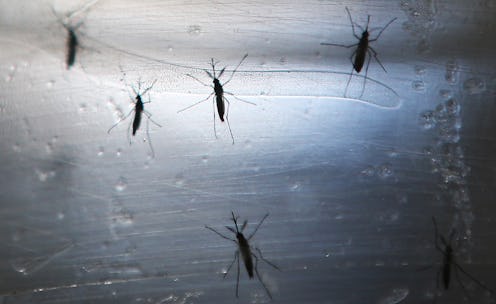Life
The CDC Just Issued A Warning About Ticks & Mosquitoes You Need To Read Before Summer Starts

Right as the weather has started getting nicer, the Center for Disease Control (CDC) has released a report saying tick- and mosquito-borne diseases are rapidly increasing in the United States. Ah, nature: sometimes it is beautiful and sometimes it is so, so murder-y and gross.
Over the past 13 years, diseases transmitted through tick, flea, and mosquito bites have more than tripled, according to the CDC report. In 2004, there were 27,000 reported cases of insect-bore illness. In 2016, that number increased to 96,000. Researchers estimate the number is even greater than that as a large percentage of cases go unreported. Additionally, nine new diseases have been discovered or newly introduced in the U.S. since 2004. Those include heartland virus, a tick-borne disease, as was an increased cases of previously established infections like Lyme disease.
“Zika, West Nile, Lyme, and chikungunya — a growing list of diseases caused by the bite of an infected mosquito, tick, or flea — have confronted the U.S. in recent years, making a lot of people sick. And we don’t know what will threaten Americans next,” CDC Director Robert R. Redfield, M.D. said in the report. “Our Nation’s first lines of defense are state and local health departments and vector control organizations, and we must continue to enhance our investment in their ability to fight against these diseases.”
“Vector” is the more scientific word for insects that feed off blood and are capable of transmitting viruses and other pathogens. Just another reason to stay inside where there is air conditioning and reliable Wi-Fi and little to no bugs that want to kill you.
The cause of this rapid rise in bug bite-borne infection? Warmer weather. However, the report doesn’t specifically mention climate change in regards to the rise global temperatures. Dr. Lyle R. Petersen, CDC director of vector-borne diseases, credited other factors like increased air travel and a lack of vaccines, according to the New York Times. “Mosquitoes and ticks and the germs they spread are increasing in number and moving into new areas,” the report also specifies.
The U.S. Zika epidemic in 2016 lead to a rise in awareness of mosquito-borne diseases as well as increased efforts to prevent the spread of such diseases. However, according to the CDC’s latest report, more than eight in 10 mosquito control agencies still lack the capacity for basic prevention. This is a big problem as these agencies are our most vital line of defense against the wide and rapid spread of vector-borne diseases.
“It’s very important that the public is very aware that these are more than summertime nuisances — you can get very severe diseases from ticks and mosquitoes," Dr. Petersen told CNN. In 2003, Dr. Petersen actually contracted West Nile virus from a mosquito bite, which had in in bed with headaches, fever, and a rash for a week. He added it took him an additional “three months to get back to normal.” These vector-borne illnesses are no joke.
What can we do to keep ourselves safe and free from bug-bites-turned-disease? Mostly, just being more vigilant about the methods you’re already been using to stop from getting bitten up in the summer. The CDC recommends using EPA-registered bug repellent (you can find a list of those online); wear protective clothing, especially if you’re going to be in tall grass or in wooded areas; be extra conscious of the clothing and items and pets, in particular, that are coming in- and outdoors. Friends don’t let friends return home from camping without a flea check.
If you think you may have gotten sick from a bug bite, it’s important to see a doctor. Reporting it not only helps you get better quicker, it also helps it from spreading to other people.
Or, you know, you could always just stay indoors.